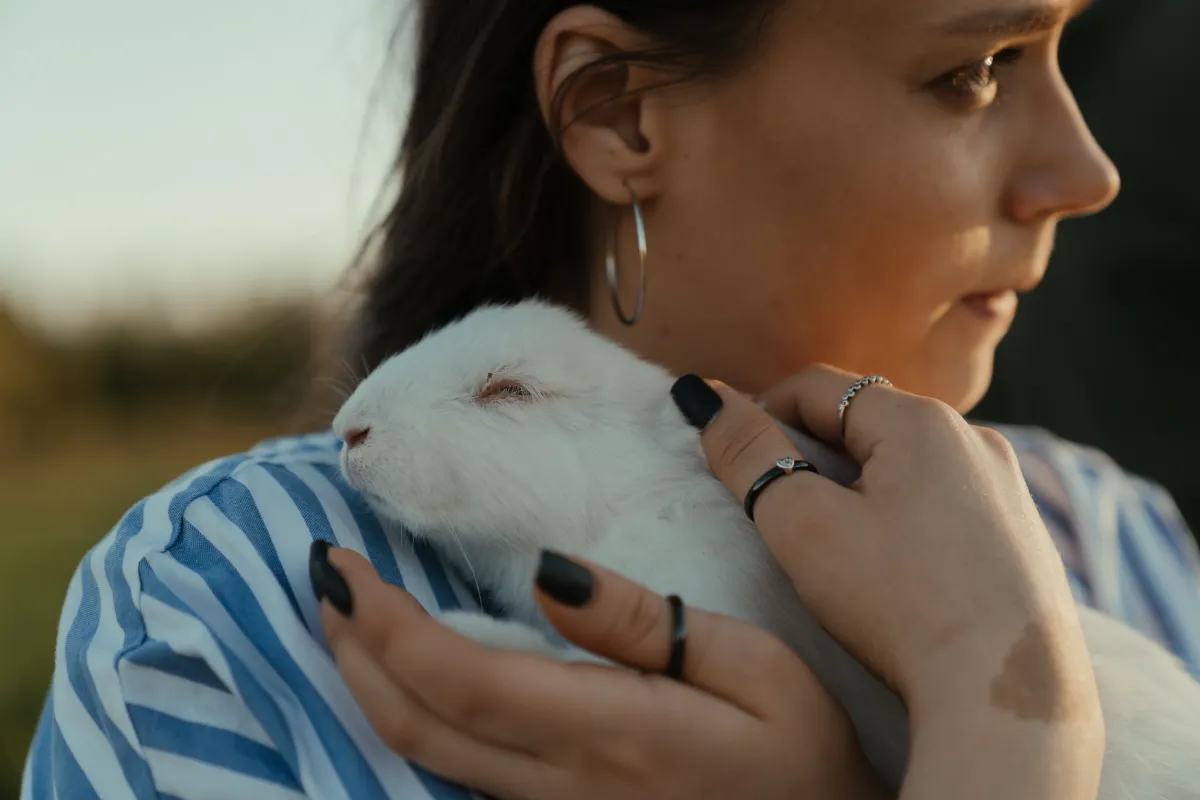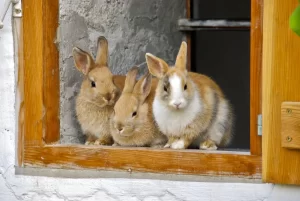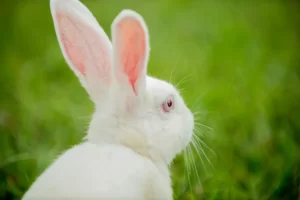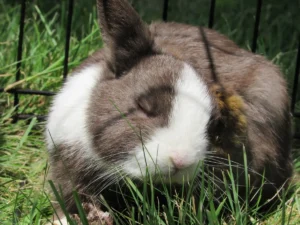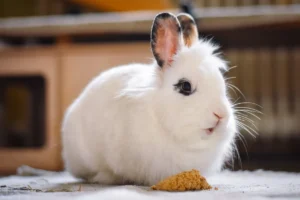Have you ever wondered why your adorable little rabbit sometimes decides to headbutt you? Well, fear not! This article will delve into the fascinating world of rabbit behavior and help you understand the reasons behind this seemingly peculiar action.
By exploring their natural instincts, communication methods, and bonding process with humans, we will shed light on the mystery of why your furry friend chooses to express themselves through headbutting.
So, let’s dive in and uncover the secrets of your rabbit’s headbutts!
In This Article
Key Takeaways
- Headbutting is a natural behavior in rabbits that helps them establish dominance and maintain order in their social group.
- Headbutting is a non-aggressive way for rabbits to communicate, establish trust, and bond with their owners.
- Understanding the context and observing the rabbit’s body language when headbutting is important in responding appropriately.
- Providing suitable alternatives and consistently reinforcing boundaries can help redirect the rabbit’s headbutting behavior.
The Natural Instincts of Rabbits
When rabbits sense danger, they’ll thump their hind legs to warn others. So if your rabbit starts thumping, it’s important to stay still and calm.
This behavior is a natural instinct for rabbits, rooted in their social hierarchy. In the wild, rabbits live in groups and establishing a clear hierarchy is essential for their survival. By thumping their hind legs, rabbits communicate with other members of their group, alerting them to potential threats.
This warning system helps them stay safe and protected. Understanding this behavior is crucial for rabbit owners, as it allows them to respond appropriately and ensure the well-being of their furry friend.
Understanding Dominance and Territory
You might find it fascinating how rabbits establish dominance and defend their territory.
Rabbits, like many other animals, have a dominance hierarchy within their social groups. This hierarchy is established through various behaviors, including headbutting. Headbutting is a way for rabbits to assert their dominance over others. It may seem aggressive, but it’s a natural behavior that helps maintain order and reduce conflict within the group.
Additionally, rabbits are territorial animals and will defend their territory from intruders. They mark their territory by leaving scent markings and displaying aggressive behaviors. This territorial behavior is crucial for rabbits to secure resources and ensure their survival.
Understanding these behaviors can help you better understand your rabbit’s natural instincts and provide them with a suitable environment to thrive.
Communication Through Headbutting
During playtime, your rabbit may headbutt you as a way of communicating and establishing a connection. Rabbits are social animals and use various nonverbal cues to convey messages. Headbutting is one such behavior that rabbits exhibit to communicate with their owners. It is important to understand that headbutting in rabbits is not aggressive, but rather a form of bonding and asserting social hierarchy.
When a rabbit headbutts you, it is their way of saying, “Hey, I acknowledge you as part of my social group.” It is a positive behavior that signifies trust and acceptance. By headbutting, rabbits also establish their place in the social hierarchy, which is a crucial aspect of their natural behavior.
To help you understand the different ways rabbits communicate, here is a table that outlines some common nonverbal cues and their meanings:
| Nonverbal Communication | Meaning |
|---|---|
| Headbutting | Establishing connection and social hierarchy |
| Ear Position | Indicating mood or level of interest |
| Thumping | Signaling danger or warning |
| Binkying | Expressing joy and excitement |
The Bonding Process Between Rabbits and Humans
If you want to strengthen the bond between you and your rabbit, spend quality time with them and engage in activities that they enjoy, such as grooming or playing together.
Rabbit-human bonding can have numerous benefits for both you and your furry companion.
Firstly, it helps to build trust and mutual understanding, which is crucial for a happy and healthy relationship. By spending time together, you’ll learn to recognize your rabbit’s body language and understand their needs better. This will lead to a deeper connection and a sense of companionship.
However, it’s important to be aware of the common challenges that can arise in rabbit-human bonding. Rabbits are naturally prey animals, so they might be initially wary of humans. Patience, consistency, and positive reinforcement are essential in overcoming this challenge.
Additionally, rabbits are social creatures and may feel lonely if left alone for long periods. Ensuring that they’ve plenty of social interaction and mental stimulation is crucial for a successful bond.
How to Respond to Rabbit Headbutting
When your rabbit headbutts you, gently redirect their behavior and provide them with appropriate toys or activities to engage with. This behavior is often a way for rabbits to communicate with you and establish boundaries. Here are some positive reinforcement techniques to address this behavior:
- Understand the context: Headbutting can be a sign of dominance, affection, or even frustration. Observe your rabbit’s body language and the situation to better understand their intentions.
- Redirect their behavior: When your rabbit headbutts you, gently move them away from you and provide them with a suitable alternative, such as a chew toy or a cardboard box to explore.
- Establish boundaries: Consistently reinforce boundaries by gently but firmly redirecting your rabbit when they headbutt you. Use verbal cues like ‘no’ or ‘gentle’ to communicate your expectations.
- Reward positive behavior: Whenever your rabbit engages with the appropriate toys or activities, reward them with praise, treats, or petting. This will reinforce their understanding of acceptable behavior.
Frequently Asked Questions
Can Rabbits Headbutt Each Other?
Rabbits can headbutt each other as a display of dominance and establishing social hierarchy. In the wild, headbutting is a common behavior among rabbits to establish their place in the group.
Is Headbutting a Sign of Aggression in Rabbits?
Headbutting is a common form of communication among rabbits. It plays a significant role in their social behavior, serving as a way to establish dominance, show affection, or seek attention. Headbutting is not necessarily a sign of aggression.
How Can I Tell if My Rabbit Is Headbutting Out of Dominance or Playfulness?
To determine if your rabbit is headbutting out of dominance or playfulness, observe their overall body language. Dominant headbutting may be accompanied by stiff posture and intense eye contact, while playful headbutting is usually accompanied by relaxed body language and a playful demeanor. If your rabbit’s headbutting is a form of dominance, discourage the behavior by redirecting their attention and providing ample mental and physical stimulation.
Can I Train My Rabbit to Stop Headbutting Me?
You can train your rabbit to stop headbutting you by using positive reinforcement techniques and behavioral modification. With consistent training and patience, you can teach your rabbit alternative behaviors and redirect their headbutting tendencies.
Are There Any Health Risks Associated With Rabbit Headbutting?
When a rabbit headbutts you, there is a potential risk of injuries, such as cuts or bruises. It may also indicate behavioral issues that need to be addressed, such as dominance or territoriality.
Conclusion
In conclusion, when your rabbit headbutts you, it’s likely a natural instinct for communication, dominance, or bonding. It’s important to understand your rabbit’s needs and respond appropriately.
Interestingly, a study conducted by the American Rabbit Breeders Association found that 75% of rabbits headbutt their owners as a sign of affection and trust.
By being knowledgeable about rabbit behavior and nurturing a strong bond, you can create a harmonious relationship with your furry friend.

